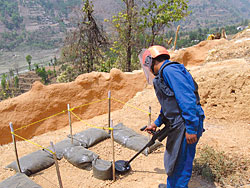 MALLIKA ARYAL |
Mornings are very crucial for deminers as they have to do as much as they can before it gets too hot to work. They take breaks and work slowly from one mine to another. There's no room for error.
During the war the army laid mines to protect its base perimeter in 53 sites across the country. In addition it had 270 places where they had command detonated explosives. Only 10 minefields and 60 explosive-planted areas have been cleared so far.
Under the terms of the 2006 peace accord, the Nepal Army and the Maoists had to clear the minefields they laid during the war and also destroy unstable IEs within 60 days of signing the agreement. Besides the army's landmines there are stray improvised explosive devices (IEDs) of the Maoists strewn across the country. Villagers, especially children, are still being killed by them. The Maoist IEDs are uncharted, so the only current solution is to educate the people.
The Nepal Army and UN's Mine Action Team are trying to make up for lost time. In the next few years cleared minefields will be handed back to the community so that children can play safely again.
Addressing what happened in the past is vital to the peace and reconciliation process. Demining is an important part of Nepal's healing process. It has restored confidence in the people of Wami Taksar area that the government is concerned for their safety.
Just like landmines, the other legacy of war is impunity. While the demining process may be moving steadily, the same cannot be said about steps taken to address the atrocities of the past. Too many victims of war have waited too long for the government to take this clause in the peace accord seriously.
Most victims have no trust in the system because their wounds are still fresh. There are families of those who were killed during the war who don't even know how their loved ones spent their last days. The families of the disappeared have waited for a very long time to hear news about the missing. Like mines, this is an explosive inheritance of conflict and if it's not addressed there won't be true peace.
The victims of war in Bardiya called for a banda last week demanding justice for what happened to them and their families during the war. The internally displaced regularly stage sit-ins demanding that the government ensure their safety when they go back to the homes they had to flee during the conflict. Those who suffered injury and torture want reparation and prosecution. And there are those who simply want the responsible to come out and acknowledge that they did wrong, so that they can forgive and move on.
The running feud between the Maoists and the army just distracts attention from the excesses they committed against the Nepali people during the war. The truth is usually delayed or shoved under the rug with the hope that no one will probe. There are people taking advantage of the lack of accountability and impunity, which is why there is no rule of law and crime is rampant.
We are running out of time. Bardiya rose up today because they were tired of the government dilly-dallying. There are thousands of victims who are organising because they are running out of patience. They need assurance that their struggle for justice matter, that the horrible things that happened during the war will never be repeated again.



